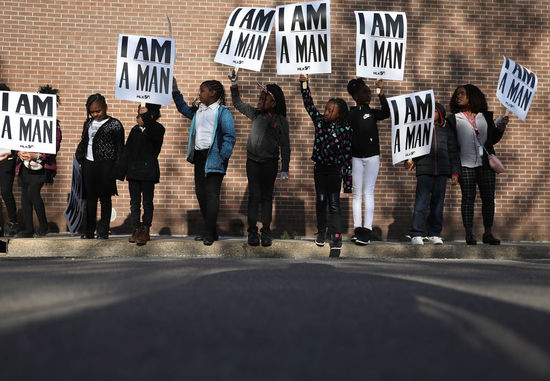The Last Strike
I’ve worked for labor unions for 40 years and I’m proud of it. But I’ve also witnessed, and suffered, from the employers’ and their conservative political allies’ relentless and successful attacks on workers.
Unions have lost ground over the last 40 years. Weaker unions meant we had to bargain contracts with so-called 401ks instead of real pensions, and negotiate for vastly increased deductibles in health insurance coverage, instead of plan improvements.
Weaker unions also meant that workers’ have almost stopped utilizing their most important weapon, the strike.
In past years in the United States, general strikes in whole cities or regions, or whole industries have involved hundreds of thousands of workers acting together. Won or lost, those labor struggles cracked the underpinnings of industrial society.
When workers in the 1930s occupied their factories with sitdown strikes, thousands of their neighbors would flock to the site to defend the workers from police and strikebreakers.

Millions of workers waged dozens of strikes every year and won wages and benefits that accelerated truckers, nurses, laborers, waitresses, and roofers into the middle class, throughout the 1950s, 60s, and 70s.
But since then the bosses and reactionary politicians have beat us back. Workers only waged seven major strikes, involving over 1000 workers, in 2017.
I helped the workers wage one of those large strikes. It was an even rarer event because they struck a private company, not a school district. Those workers had a special kind of guts and cunning I haven’t seen often.
Let’s just say these events took place in Industrial City.
Several turbulent rivers tumble down from the foothills and merge in the flatlands near Industrial City. The water access meant that many companies crowded into Industrial City over the last 100 years; paper, steel, stockyards and such.
Our story deals with ZZZ Mfg. which was the latest successor to a manufacturing facility that converted natural resources into products. The workers in this portion of the Western United States were strongly pro-union. They’d waged militant strikes against the oligarchs since the satanic mills first spewed dense pollution in Industrial City in the late 19th century.

A legendary group called the IWWs, or “Wobblies,” (Industrial Workers of the World) had organized unions in this vicinity decades ago. Some of their militant approach still lived on in the workers at ZZZ Mfg.

These workers ran their union differently than most others, a leftover tradition from the Wobblies. All of their union officers still worked full-time at ZZZ Mfg. They’d take personal time to tend to union business. The rest of the time, they were on the shop floor, working next to the other union members.
Hedge Fund Capitalists had just bought ZZZ Mfg. One family had run ZZZ well for decades and grown it significantly, before flogging it to Hedge Fund.
Hedge Fund didn’t like “squandering” money on the workers’ health benefits, which were modest “Kaiser plans.” When the labor contract was about to expire, they demanded severe health care cuts.
The workers knew they were facing trouble. They hadn’t gone on strike since 1975. But they dusted off the old “how to strike” manuals and began holding classes on strike preparation. They sought out allies. Signs began appearing in neighborhood store windows stating “We support the ZZZ workers.”
They hired me and an economist, to wage a “corporate campaign” that would investigate, and widely publicize, ZZZ Mfg’s environmental sins and corporate malfeasance. ZZZ was dirty. Fires burst out on ZZZ’s assembly lines weekly, near vats of flammable and toxic chemicals.
I would go to the union’s offices. One by one workers would set aside their welding torches or leave their work site at the treatment plant and meet with me. They would show me covertly taken pictures of ZZZ’s operations, we would scrutinize aerial photos of ZZZ’s smokestacks, and we would catalog all of the workers’ health, and environmental violations.
We asked for details on the 1000 chemicals used at ZZZ. We shepherded whistleblowers to the environmental agencies. We went to the Tribes’ protests against oil terminals, and they came to our protest against the water pollution permit for ZZZ. We leafleted ZZZ’s largest customers.
But Hedge Fund told ZZZ to hunker down. The contract expiration date approached.
I felt panicky. I’d endured some terrible strikes, when the bosses had prepared for years in advance, and the workers prepared little at all. The bosses have a small army of professional strikebreakers specially trained to operate your machines in your factory during a strike, and there are also private, thuggish police to beat up union picketers. ZZZ had several non union operations in other states that would keep operating even during our strike.

Tough workers lived in Industrial City. They’d tipped over trucks during a strike at a different facility. But that’s not enough to win a strike.
The regional union leaders and I met again and again with the local union members. They said they were ready to strike, but we doubted they knew what to expect. The union members voted down offer after offer and then the contract expired. The Company’s “Last, Best and Final” offer was not bad at all. You’d make up in wages more than you lost with the higher medical deductible.
We’d sit at a table in the front of the room.
The workers sat on folding chairs, in jeans. jumpsuits, overalls, hairnets, caps, and t-shirts, many still grimy from their shift at ZZZ, having come directly from work.
The regional leader would explain that they had got as much as they could get in this latest contract offer and call for a straw vote by hands. It would be rejected.
Someone would call out, “No contract, no work!”
Folks would clap.
Cold sweat ran down my forehead.
The company mocked the fact we’d even taken a strike vote.
One particularily odious executive blathered at an industry conference, talking about the decline of labor strikes. They quipped:
“Apparently our employees at ZZZ haven’t gotten the memo that strikes are out. They actually voted to have one, ha ha.”
We kept meeting with the company, pressing them for chemical information, getting sneers in return. We filed an Unfair Labor Practice charge with the National Labor Relations Board, because the company’s failure to provide the chemical data meant they were “bargaining in bad faith,” which is a labor law violation.
That helped us considerably. If you strike against unfair labor practices, the bosses aren’t allowed to permanently replace you with strikebreakers.
So a few days later. the workers struck, at the 6 am shift change. As the sun rose, the spewing factory smoke seemed to wink out at one smokestack after another until the sky turned blue again. I was on the picket line with the workers.
Then something happened that made me think this was going to turn out different. Every single worker left the plant. Every one. Over 1000 workers left their high-paying jobs. Not one remained at their machine, as a good company stooge. Not 1 out of 1000.
I’d been in many strikes. In 40 years, very few groups of factory workers walked out 100% on strike. There’s always a few shirkers.
There were however, a few maintenance technicians still working, who were employees of a separate contractor, and did not work directly for ZZZ.
After a half hour or so, some supervisory personnel came speeding in their pickup trucks through our picket line.
When the maintenance workers saw that, they stopped repairing the plant, (they worked for a separate contractor), and they bagged their tools and left.
Then came the pickups of strikebreakers with the confederate flags and out of state plates. They’d speed up and swerve towards picketeers and finally hit one.
The workers scattered, frightened. The police came and arrested some picketeers for blocking traffic. More strikebreakers sped in. I’d been to this rodeo before.
I adjourned with some of the workers who were high level plant operators, but still union members. They had wireless access to all of the factory’s real time operating data. We watched to see how the strikebreakers would restart the factory.
We watched our own data screen and tracked how they repowered a boiler, opened some feed lines, sent heat to the kilns, and then, they vented a reactor vessel prior to restarting it. As we watched the pressure gauges, we knew that materials left in the reactor a while ago had, well, reacted.
As the strikebreakers opened the vents, a putrid sulfurous stench from the reactor swept over nearby Industrial City, spurring over 100 complaints to the environmental agency.
By now, ZZZ and their Hedge Fund owners were widely hated. But nonetheless, the strikebreakers began to learn the process, and to manufacture products. After two weeks, the workers stopped striking and returned to work. The company kicked out the strikebreakers and accepted the workers’ reinstatement. They could have fired all the workers, but they were wary of the pending Unfair Labor Practice charges.
Since the workers did not have a contract, the company pompously imposed their Last Best and Final offer. But that was not an awful contract and had gains.
The snippy corporate mouthpiece who’d quipped the union hadn’t got the memo that strikes were out? The next memo the company got said the strike had cost them $20 million.
The Unfair Labor Practice charges went back and forth. Then the Labor Board received new, worker hating appointees. They ruled that the company had bargained fairly.
But the workers kept their union, fought for their health care and after more dickering they did finally approve a new contract.
And Hedge Fund then sold ZZZ to some other faceless entity, perhaps having found the spirit of the Wobblies to be incompatible with their corporate culture or lack thereof.
The last two years of crabbed rulings from the politicized Labor Board would insure that the ZZZ workers could not wage a similar strike today.






